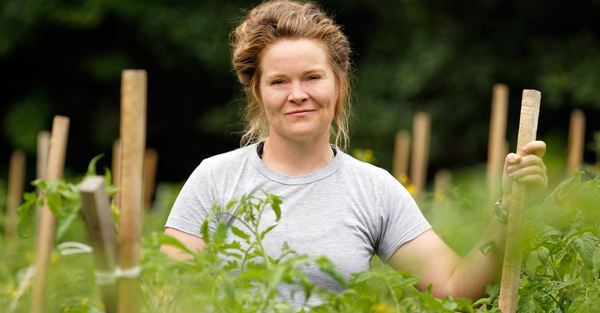
Film Review: “Farmland”
by John DeFore
James Moll interviews a half-dozen twentysomethings who’ve chosen the challenging life of a farmer. Attractive but none-to-deep celebration of hard-working heartlanders.
SIX YOUNG AMERICANS share their experience of life on farms in James Moll’s “Farmland,” a documentary whose take on its subject is more upbeat and uncomplicated than most moviegoers will expect. Its feel-good tone, designed more to celebrate than enlighten, will play well with those already in agriculture and outsiders with romantic notions about embarking on this tough-but-rewarding lifestyle; a series of special bookings around the country will require strong word-of-mouth support.

Moll’s half-dozen subjects are not the most diverse group of people. All white and almost all male, the sole woman among them is also the only first-generation farmer: Spunky Margaret Schlass, who drives her produce to market in a truck with “One Woman Farm” emblazoned on its side, is an impressively hard worker representing the realities faced by urban locavores who dream of starting their own small farms.
The men of the film took more familiar routes to farming; some have families who’ve been in the business for as long as six generations. They embody the ever-changing conditions of an industry that demands modern efficiencies: Where Schlass can work her small property with tractors built in 1945, corn and soybean farmer David Loberg drives a planting truck so sophisticated he has to install software updates before he can use it. Sutton Morgan is trying to chart a middle course, building a large-scale organic produce business alongside the conventional one his father still runs.
Fathers and families are a major theme here, and watching the close relationships between generations is one of the film’s pleasures. We don’t really need Nathan Wang’s Copland-evoking score to understand that, though these men are educated and no strangers to the modern world, they possess a direct link to a tightly knit way of life that has all but vanished in America.
Poultry farmer Leighton Cooley says that way of life isn’t as endangered as city folk might think.
“About 90 percent of the food grown in America comes from a family farm,” he reports, a claim that will puzzle viewers familiar with agrigiants like Tyson Foods. But this is not a film about corporations and industrial farming, or about threats to the environment, or about any of the other things that might cause citizens to worry about our food supply or its sustainability.
Though the film acknowledges the hardships of the farmer’s life—unpredictable crop prices, reliance on rainfall that may not come when you need it — it makes only the tiniest nod to negative realities arising from acts of man instead of nature. Animal cruelty footage gathered by activists is discussed only long enough for someone to say “I truly believe that bad behavior is pretty rare in our industry”; the grotesque levels of pollution and food-safety issues arising from too-large commercial farms aren’t even mentioned.
That’s ground for all the other documentarians to cover, Moll seems to think. And though this attitude leads to a somewhat superficial-seeming doc, one presumes that many viewers will be happy to see a movie about farming that’s nothing but good news.
Locally, the film is showing at two locations: Emagine Canton and the Emagine Hollywood, in Birch Run.
